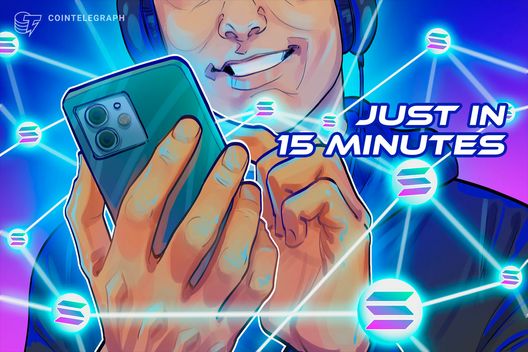The cryptocurrency landscape is rapidly evolving, and the latest development comes from the Solana blockchain, known for its impressive speed and low transaction costs. Developers are now empowered to create cross-platform mobile applications seamlessly within the Solana ecosystem, promising a more user-friendly experience for crypto enthusiasts and newcomers alike.
In an exciting update, developers can integrate essential features such as wallet capabilities, token transactions, and non-fungible tokens (NFTs) in a remarkably short time frame of just 15 minutes. This significant reduction in development time opens the doors for innovation and creativity, allowing developers to focus on building engaging applications without the usual complexities associated with blockchain technology.
“The ease of building mobile applications on Solana will likely stimulate a surge in app development, potentially transforming the way users interact with digital assets,”
By simplifying the app creation process, Solana is positioning itself as an attractive option in the competitive landscape of mobile blockchain applications. With the industry’s focus shifting toward accessibility and ease of use, this initiative could spark a wave of new projects that harness the full potential of mobile technology and decentralized finance.
As the cryptocurrency industry continues to grow, innovations like these highlight the ongoing efforts to bridge the gap between traditional app usage and blockchain technology, making it easier for everyday users to engage with digital currencies and assets.
Building Cross-Platform Solana Mobile Apps
Key points regarding the development of cross-platform mobile applications on the Solana blockchain include:
- Rapid Development
- Developers can create mobile apps in approximately 15 minutes.
- Simplifies the app development process, making it accessible to a wider range of developers.
- Wallet Integration
- Facilitates seamless user transactions and interactions with digital assets.
- Enhances user experience by allowing easy access to cryptocurrency wallets.
- Token Actions
- Enables users to manage and interact with tokens directly within the app.
- Potential for increased user engagement with various DeFi activities.
- NFT Support
- Allows for the creation and management of non-fungible tokens, opening new market opportunities.
- Encourages creativity and innovation within the app’s ecosystem via NFTs.
- Cross-Platform Capability
- Applications can run on multiple mobile OS, broadening the audience reach.
- Reduces development costs and time by leveraging shared codebases.
Revolutionizing Mobile Development with Swift Solana Integration
The recent announcement about the ability to create cross-platform Solana mobile applications in just 15 minutes is a game changer for developers and entrepreneurs alike. This swift integration not only promotes efficiency but also enhances user experience through seamless wallet connections, token transactions, and NFT functionalities. As mobile technology rapidly evolves, staying ahead in the competitive landscape is crucial; this integration provides a notable advantage.
Similar news in the realm of cross-platform development often centers around frameworks like React Native and Flutter, which also promise quick deployment and user-friendly interfaces. However, they may not offer the specialized blockchain features that Solana provides, such as high transaction speeds and lower fees. This specificity can position Solana as a preferred choice for developers focused on the booming NFT and decentralized finance (DeFi) markets.
On the downside, reliance on a particular blockchain introduces vulnerabilities; should Solana face any network issues or scalability challenges, developers might struggle with their applications’ performance and user satisfaction. Furthermore, as more developers lean toward Solana for its quick setup, competition within this niche may increase, potentially saturating the market with similar offerings.
This development primarily benefits tech startups and individual developers eager to break into the blockchain space without substantial investment in time and resources. These developers can use the Solana platform to create innovative applications quickly, giving them an edge in capturing market attention. Conversely, traditional enterprises that rely heavily on established frameworks may encounter hurdles adapting to the fast-paced changes of blockchain technology, leading to potential integration issues and strategic misalignment.

















